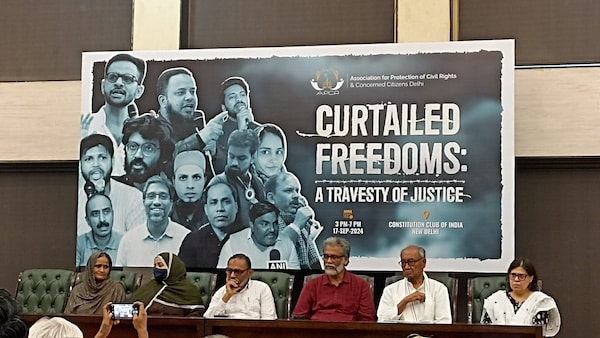Several family members of the political prisoners and civil rights activists gathered in India’s capital Delhi on Tuesday, September 17 to reiterate their demand for immediate release of all political prisoners. They highlighted how their continued presence in jails for years without trial or bail is a travesty of justice and of rule of law in the country.
The meeting was organized by the Association of Protection of Civil Rights (APCR). Apart from the family members of the jailed activists, it was also attended by some prominent lawyers, senior journalists, a former judge in the Supreme Court of India, and several celebrities.
The meeting was organized to highlight the case of student leaders and activists such as Umar Khalid, Gulfisha Fatima, Khalid Saifi, Meeran Haider, Sharjeel Imam, Athar Khan and others who have spent more than four years in prison without bail or trial since their arrests in 2020.
Most of them hail from prominent universities in Delhi such as Jawaharlal Nehru University (JNU) and Jamia Millia Islamia (JMI) and were active organizers of nationwide anti-Citizenship Amendment Act (CAA) protests in 2019-2020. The CAA was promoted by the Hindu-supremacist, Bharatiya Janata Party-led government in 2019.
The act, which was finally implemented earlier this year despite the opposition, promises Indian citizenship to any non-Muslims citizen of its neighboring countries of Afghanistan, Pakistan and Bangladesh. The act was opposed on the grounds that it was discriminatory and defies the principle of secularism fundamental to India’s constitution.
The CAA was also opposed as it was accompanied by a proposed National Register of Citizenship (NRC). NRC which was later dropped by the government, would have required all residents of India to produce documentary evidence to prove their Indian citizenship.
Umar and dozens of other activists and anti-CAA organizers were arrested by the Delhi police in February 2020 after the outbreak of riots in some parts of the city when the anti-CAA protests were still ongoing.
The riots broke out when some members of the ruling BJP and its sister organizations who had termed the anti-CAA protesters as “anti-national” attacked some of the protest sites in northeast Delhi. In the violence that erupted following the attack, over 53 people, mostly Muslims in largely working class localities were killed and their properties were looted or burnt. Hundreds of people, mostly Muslims, were arrested by the police. Thousands of Muslims were temporarily displaced and forced to live in shelters.
The state used the riots to clamp down on anti-CAA protests and arrest the organizers. The arrests were made under the Unlawful Activities Prevention Act (UAPA). Umar and others were accused of hatching a “larger conspiracy” to organize the riots. None of the prominent members of the BJP involved in attacks on the protest sites were ever arrested.
The UAPA has been deemed draconian by most of the opposition including the left parties in India.
The Communist Party of India (Marxist) has called for the scrapping of the UAPA, claiming it has been used by the Narendra Modi led-BJP government to silence the opposition and to put its critics behind bars in cases such as Bhima Koregaon and Delhi riots.
Scores of scholars and activists were arrested in India in 2018 and later charged under the UAPA by the BJP government on charges of them conspiring to kill prime minister Modi. Some of them were released on bail after spending years in jail without trial or even a chargesheet. Some of those arrested in 2018 are still in jail without bail or trial.
Justice delayed
Except for a few, most of those arrested in the Delhi riot case in 2020 still languish in jail as trial and higher courts have either rejected their bail pleas or delayed the hearings in their cases using various tactics. In some instances, judges have recused themselves from hearings at the last moments or in some cases they were transferred or promoted, causing further delay in the hearing.
Human rights defenders allege that the delay in holding the hearings is deliberate as judges are adhering to the political pressure of the government which does not want Umar and others to be released. Family members of the activists have also criticized the delay in the bail trials, questioning the rule of law in the country. Some of them highlighted how the delays violate basic principles of justice particularly at a time when the Supreme Court of the country repeatedly talks about the principle of “bail is a rule and jail is an exception.”
Dipankar Bhattacharya, general secretary of the Communist Party of India (Marxist-Leninist) Liberation also participated in the meeting held on Tuesday. He questioned the duality of the practices which even the top courts in India seem to be following. They talk about freedom of peaceful movement in some instances, but allow the persecution of activists who carried out peaceful movement in other cases.
On Monday, a documentary made on the life of Umar was screened in several parts of the country with the main event organized in Kolkata. Several of Umar’s friends and colleagues spoke before and after the screening claiming the plight of Umar and other accused of Delhi riots reflect complete failure of the rule of law under the BJP. They claimed religious discrimination in India under the BJP rule has become a norm which explains why Khalid’s bail pleas are delayed.

